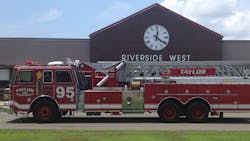PA Volunteer FFs Might See Tax Credits by 2020
Taylor Borough Council will vote tonight to give tax credits to its volunteer firefighters beginning in 2020.
The borough joined dozens of municipalities across the state last year when it established its firefighter tax credit program, but the program’s eligibility time frame would be in effect from Nov. 1, 2019, through Oct. 31, 2020. To give firefighters the tax credits sooner, council is voting on an amended ordinance that rolls back the first eligibility period from Jan. 1, 2019, through Dec. 31, 2019.
That means firefighters will be eligible for a 20 percent credit on their municipal property taxes and up to $500 on their earned income tax in the borough in 2020.
To be eligible, firefighters must meet several criteria, including responding to a certain number of calls, the amount and level of training they participate in, time spent volunteering in avenues like fundraising, maintenance and bookkeeping, and their time served. Firefighters must also live in Taylor.
The borough’s hose companies respond to about 300 calls a year, and volunteers must respond to 50 percent of calls to be eligible, firefighter and Councilman John Tigue said. Tigue will not take any tax credits due to his positions with council and the department.
Between Taylor Hose and Engine Company 1 and Taylor Fire Department Station 95, the borough has about 25 active firefighters, he said.
“It gives the incentive to be a volunteer firefighter and live in Taylor borough,” he said.
Tigue brought up the tax credits several years ago, but the borough decided to talk to its firefighters, state representatives and keep an eye on other local departments that implemented the credits, he said.
“Everybody knows that volunteer firefighter service isn’t what it was years ago,” he said, adding that any attempt to increase or retain members “is well worth it.”
“It might help a little bit,” he said, noting that they will take whatever they can get. “Anything helps to be honest.”
There’s no cookie-cutter solution to draw in and retain volunteer firefighters across the state, said Bruce Trego, the state’s fire commissioner.
“That’s the nature of the commonwealth,” he said, explaining that what works in one area won’t work everywhere.
For example, firefighters who don’t own their homes or those with low incomes won’t see as much of a benefit as others.
“However, there are those that are the opposite,” he said. “That will work very well for them.”
From his experience speaking to firefighters, tax credits help retain some members, but he couldn’t speak to increased recruitment.
Clarks Summit passed a similar ordinance in September, and while it’s “a little bit premature” to see the effects, borough Fire Chief Jay Miller said “it seemed to be well received.”
The borough has 24 eligible firefighters, and Miller hopes it will encourage current members to volunteer more often.
In Taylor, tax credits also apply to nonprofit volunteer emergency medical services, but the borough does not have a volunteer ambulance company because it contracts with Pennsylvania Ambulance, borough manager Dan Zeleniak said.
Tigue hopes to get additional firefighters with the credits, but “it’s a wait and see” scenario, he said.
“With the volunteer firefighters, you risk your life every time for free,” Tigue said.
———
©2019 The Times-Tribune (Scranton, Pa.)
Visit The Times-Tribune (Scranton, Pa.) at thetimes-tribune.com
Distributed by Tribune Content Agency, LLC.
